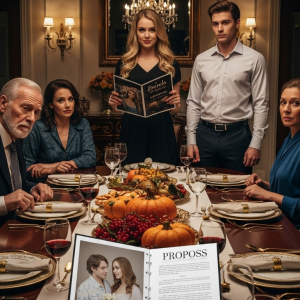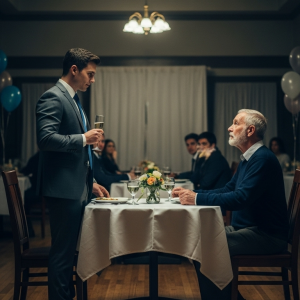In the cathedral of Yosemite, amidst the ancient sequoias and the granite cliffs that scraped the sky, Jake was a pariah. At seventeen, he was a collection of jagged edges the other campers found unsettling: the faded, intricate tattoo on his forearm, the way his dark hair fell over his eyes, the profound, unnerving silence he wrapped around himself like a shroud. He was the “trouble” the parents whispered about around their crackling campfires.
Among the most vocal of these parents were the Hendersons. David and Sarah Henderson were city people, accustomed to a world that was ordered, predictable, and sanitized. They had brought their four-year-old daughter, Mia, to the wilderness to experience its beauty, but they also brought their urban anxieties with them. And those anxieties had found a clear and present focus in Jake.
“Mia, honey, stay away from that boy, do you understand?” David Henderson had said on their first day, his voice a low, urgent command as Jake walked past their campsite. “Some people aren’t safe.”
Jake heard him. He always heard them. He just didn’t have the energy to care. He retreated to his usual spot on a flat, sun-warmed rock overlooking the valley, pulling out his worn leather-bound notebook. To the others, it looked like he was sulking, a moody teenager lost in his own world. But he wasn’t. He was working.
His pen moved with a steady, practiced hand, not sketching angsty poetry, but tracing the intricate capillaries of the forest. He drew the official, well-marked trails, but also the ghost paths, the forgotten logging roads, and the faint deer trails that snaked through the undergrowth. He knew the way a stream’s bend could disguise a treacherous drop-off, the way the afternoon sun could make a safe path look identical to a dangerous one. He wasn’t just in the forest; he was in a constant, silent conversation with it. It was a language born of obsession, a fluency paid for with a price no one could imagine.
The late afternoon sun cast long, golden shadows across the campsite. The air was filled with the scent of pine and sizzling barbecue. It was a perfect picture of family, community, and idyllic escape. And then, the picture tore.
It started with a single, fluttering monarch butterfly. Mia Henderson, her face alight with the pure, uncomplicated joy of a four-year-old, chased it. The butterfly danced from a patch of wildflowers at the edge of the clearing, over a fallen log, and into the dense line of trees that marked the beginning of the true wilderness. And Mia, giggling, followed.
The first sign of trouble was Sarah’s voice, a casual, singsong call. “Mia? Honey, dinner’s almost ready!”
Silence.
The call came again, a little louder, a little less certain. “Mia?”
The panic was a spark that jumped from person to person. David’s head snapped up from the grill. Other families stopped what they were doing, a sudden, collective tension gripping the clearing. Within minutes, the spark was a wildfire. Shouts of Mia’s name echoed through the trees, each unanswered call amplifying the terror. The search began as a chaotic, frantic scramble, parents running in circles, their movements clumsy and loud in the quiet woods.
David Henderson, his face a mask of primal fear, spun around, his wild eyes scanning the campsite. They landed on the one person who wasn’t running, the one person who sat still on his rock, watching the chaos with an unnerving calm. Jake.
In a blind surge of adrenaline and prejudice, David stormed over to him, his hands grabbing Jake’s shoulders in a rough, desperate grip.
“Where is she?!” he screamed, his voice raw with accusation, his face inches from Jake’s. “What did you do to my little girl?!”
Jake didn’t flinch. He simply stared back at the frantic man, his eyes holding a depth of sorrow that David’s temporary panic couldn’t begin to fathom. He felt the man’s hands shaking him, heard the ugly words, but it was all just noise. He was listening to something else entirely: the forest.
While the other adults crashed through the underbrush, their frantic search scaring away any wildlife and trampling any potential tracks, Jake’s mind was working with a cold, methodical clarity. He pushed David’s hands off him, his movements slow and deliberate. He walked to the edge of the clearing, to the patch of wildflowers where Mia was last seen.
He didn’t look for a four-year-old. He tried to think like one. A child wouldn’t follow a marked trail. A child follows wonder. A butterfly. The sound of something interesting. He closed his eyes, filtering out the shouting of the search party. He listened. And he heard it. Faintly, in the distance, the low, rumbling drone of traffic on the highway that cut through the valley miles below.
To a child, that sound—the sound of big, fast cars—was a siren’s song.
His eyes snapped open. He saw what the others missed. Not a trail for humans, but a faint, almost invisible path, a deer trail. It was a dangerous shortcut, a steep, direct line down the mountainside, a path that was treacherous and easy to get lost on. And he knew, with a certainty that chilled him to the bone, that it led directly to the highway.
By now, the park rangers had arrived, their movements professional and organized. They were setting up a grid search, a slow, painstaking process that would take hours. Precious hours.
Jake looked at the rangers, at the terrified parents, at the growing chaos. He knew they would never think to look there, not until it was too late. Not a single person asked for his help. To them, he was, at best, a nuisance; at worst, a suspect.
Without a word, he turned his back on them all and slipped into the trees, following the ghost path. His disappearance only confirmed their suspicions, but Jake didn’t care. He was on a different mission now. He was chasing a ghost of his own.
The deer trail was a memory etched into his soul. Every treacherous root, every loose rock, was a verse in a lament he had been reciting for two years. As he moved, the present began to blur with the past.
Flashback. Two years ago. This same forest, this same trail. “But I want to see the big cars, Jakie!” a small voice pleaded. His sister, Lily. She was five, a firefly of a girl with his same dark hair and eyes full of impossible light. “No, Lily. It’s too dangerous. Dad said to stay on the main loop.” He was fifteen, annoyed, wanting to get back to the campsite to read his book. “You’re no fun!” she had pouted, and in the second he had turned to snap a retort, she had darted off, a flash of pink disappearing down the deer trail.
He ran faster, the branches whipping at his face, the burning in his lungs a familiar penance. He could feel the memory chasing him, the frantic search, the hours of screaming her name, the park ranger’s solemn face, the single, small pink sneaker they found near the road.
He burst out of the tree line, his heart hammering against his ribs. The roar of the highway was deafening, a river of noise and speed. And there, standing on the narrow, gravel shoulder, was Mia.
She wasn’t crying. She was mesmerized, her small face turned up in wonder at the massive eighteen-wheelers thundering past, their lights like alien suns in the gathering dusk. She was a tiny, fragile figure on the edge of a monstrous, mechanical world, one small step away from oblivion.
A horn blared, a sound that ripped through Jake’s paralysis. A massive logging truck was bearing down, its driver unaware of the small child captivated by his headlights.
Jake didn’t think. He acted. He launched himself forward, a desperate, lunging tackle, wrapping his arms around Mia’s small body and pulling her back into the dirt and weeds of the embankment, just as tons of steel and rubber screamed past the exact spot where she had been standing. The wind from the truck tore at them, a physical blow.
He held her, his body trembling, his face buried in her hair. She began to cry, her fascination shattered by the sudden violence of his rescue. He picked her up, his movements weary, and began the long, slow climb back to the campsite. Back to the world that had judged him.
When he emerged into the clearing, carrying Mia, a collective gasp went through the crowd. David and Sarah sprinted towards him, their faces a chaotic mess of relief, joy, and confusion.
David reached them first, grabbing his daughter, his hands still shaking. He looked at Jake, his eyes wild. He opened his mouth, the remnants of his earlier anger and suspicion still warring with his overwhelming gratitude.
Jake didn’t let him speak. Exhausted, emotionally flayed open, he looked directly at the man who had accused him, the man who represented all of them.
“I followed the old deer trail,” he said, his voice flat, hollowed out by grief. “The one my sister took. The one that leads to the highway.” He finally met David’s eyes, and in their depths was a pain so vast it swallowed all the anger in the world. “I made a mistake two years ago. I wasn’t going to make it again.”
The three sentences hung in the air, simple, devastating, and absolute. They were not an explanation; they were a confession and a testament. In that single moment, the entire narrative of the campsite was rewritten. The “troubled teen” was gone, replaced by a boy carrying an impossible burden. The “delinquent” was a hero. The “threat” was a guardian.
The destruction that followed was not of property, but of prejudice. It was the complete and utter collapse of the easy, arrogant judgments the campers had made. Sarah Henderson stood frozen, her hand over her mouth, tears streaming down her face—tears not just of relief for her daughter, but of a sudden, crushing empathy for the boy in front of her.
The other parents, who had minutes ago been whispering about Jake’s guilt, now looked down at the ground, a collective wave of shame washing over the clearing. They saw him clearly for the first time: not the tattoos or the sullen silence, but the profound, soul-deep exhaustion of a long-term survivor of tragedy.
The next morning, as the sun streamed through the tall pines, David Henderson walked to Jake’s campsite. He looked older, humbled. The arrogance was gone, stripped away by the night’s events. Jake was sitting on his rock, his notebook lying unopened beside him.
“I…” David started, his voice thick. He cleared his throat. “I don’t just want to thank you. I need to apologize. I didn’t just accuse you yesterday. I judged you from the moment I saw you. I made up a story in my head about who you were because it was easier than seeing a person.” He took a shaky breath. “I was wrong. For my fear, for my judgment… I am so, so sorry.”
Jake just nodded, a small, almost imperceptible movement. It wasn’t forgiveness, not yet, but it was an acknowledgment. It was a start.
The rescue was a crack in the dam of Jake’s grief. In the days that followed, for the first time in two years, he began to talk. He told the Hendersons, in quiet, halting sentences, about Lily. About her laughter, her love of butterflies, about the argument they had on that final day. Speaking her name aloud didn’t magically heal him, but it allowed a sliver of light into the dark, sealed room of his guilt.
David Henderson, a man of immense wealth and influence, was profoundly changed. He saw the dangerous deer trail not just as a threat, but as a scar on the landscape that mirrored the scar on Jake’s heart. He felt a powerful, compelling need to make it right.
He used his resources not just to thank Jake, but to honor him, and to honor Lily. He funded a project with the National Park Service. Over the next few months, the treacherous deer trail was transformed. It was widened, made safe with sturdy wooden railings, and paved with fine, packed gravel.
At the head of the trail, where the wildflowers grew, they placed a simple, carved wooden sign. It read:
LILY’S TRAIL In loving memory of Lily, and in honor of the courage of her brother, Jake, who reminded us all that the deepest strength is often found in the quietest hearts.
The following summer, the Hendersons returned to Yosemite. They met Jake at the head of the new trail. He looked different. The haunted look in his eyes had softened, replaced by a quiet sense of purpose.
Together, the three of them—the man who had judged, the boy who had been judged, and the little girl who had brought them together—walked down the safe, sun-dappled path. Jake paused, his hand resting on the smooth wood of the railing, and looked down the path that no longer led to a dangerous highway, but to a peaceful overlook of the valley. He had not been able to save his sister, but by saving another, he had finally found a way to save himself. The outcast had found his way home.




